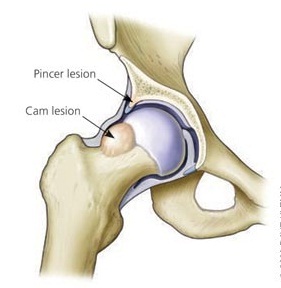Hip Impingement Syndrome Causes, Symptoms, Diagnosis and Treatment

What Is Hip Impingement Syndrome?
Hip impingement syndrome, also known as Femoroacetabular impingement, is known to affect the hip joint of young and middle aged adults.
It tends to occur when the femoral head rubs abnormally or provides limited motion in the acetabular socket.
The hip is a ball and socket joint where the socket is formed by the acetabulum. The ball is the femoral head. Together they provide a wide range of motion to humans. When damaged, treatment should be sought.
In hip impingement syndrome, bone spurs develop around the femoral head and along the acetabulum. The overgrowth of the bone may cause the hip bones to hit against each other. Over time, this can result in the tearing of the labrum osteoarthritis.
Moreover, there are three types of hip impingement syndromes namely:
Causes Of Hip Impingement Syndrome:
Causes of hip impingement syndrome vary according to the type of hip impingement involved.
- Cam impingementoccurs because the head is not perfectly round. This interferes with the femoral head’s ability to move smoothly within the hip socket.
- Pincer impingementoccurs due excessive coverage of the femoral head by the acetabulum. This causes bumping of the neck of the femur bone with the rim of the deep socket.
- Combined impingement occurs when both of the above mentioned problems occur simultaneously.
Symptoms Of Hip Impingement Syndrome:
The following signs and symptoms may be exhibited by those suffering from hip impingement syndrome:
- Stiffness in the thigh, hip, or groin
- Limited motion
- Pain in the groin area, particularly after running or jumping or being sedentary
- Pain in the hip, groin, or lower back that can occur while resting or while doing some activity
Diagnosis Of Hip Impingement Syndrome:
Hip impingement syndrome can be diagnosed via:
- Medical history
- Physical examination, which involves assessing the range of motion
- Imaging tests
- X-rays
- MRI
- CT scan
Treatment Of Hip Impingement Syndrome:
The following treatment options are available for those suffering from hip impingement syndrome:
- Physiotherapy
- Avoiding certain physical activities
- Pain management
- Injection, to relieve pain
- Non-steroidal anti-inflammatory medications.Drugs like ibuprofen can help reduce pain and inflammation.
- Surgery
- Arthroscopic surgery
- Non invasive surgery
By : Natural Health News




